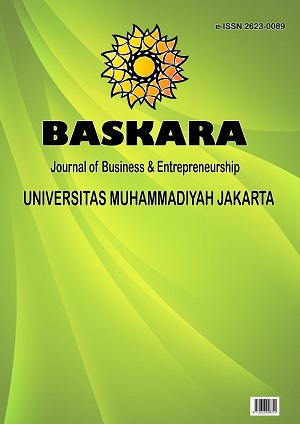The Effect of Entrepreneurial Characteristics on Entrepreneurial Competence and Entrepreneurial Competence on Business Performance of Micro and Small-Scale Coffee Shops in Bogor
DOI:
https://doi.org/10.54268/baskara.v4i1.9944Keywords:
Entrepreneurial Characteristics, Entrepreneurial Competencies, Business Performance, Coffee ShopAbstract
This research aims to analyze the influence of entrepreneurial characteristics towards entrepreneurial competencies and entrepreneurial competencies towards the business performance of micro and small scale coffee shops in Bogor. In this research, entrepreneurial characteristics consist of individual and psychological characteristics; which individual characteristics were reflected by age, education, experience, cosmopolitan; psychological characteristics reflected by motivation and need of achievement; entrepreneurial competencies reflected by managerial skill, conceptual skill, social skill, decision making skill and time managerial skill; business performance reflected by profit and sales volume. This research used 60 data samples of coffee shops consisting of 30 unit micro scale and 30 unit small scale coffee shops that were collected through random sampling in Bogor from February 2018 until June 2018. The data were analyzed by SEM-PLS analysis with SMART PLS 3 software. The result showed that entrepreneurial competencies in small scale model were influenced by individual characteristics and psychological characteristics whereas entrepreneurial competencies in micro scale model were only influenced by individual characteristics. The business performance was influenced by entrepreneurial competencies both in micro scale model and small scale model.References
Aliyu, M. S. (2017). Entrepreneurial Competencies and the Performance of Small and Medium Enterprises (SMEs) in Zaria Local Government Area of Kaduna State. International Journal of Entrepreneurial Development, Education and Science Research, 4(2), 116.
Aulia, M. R. (2020). Pengaruh Kompetensi Kewirausahaan Terhadap Kinerja Usaha Kedai Kopi Skala Mikro dan Kecil Pada Masa Pandemi Covid-19 di Kota Medan. Jurnal AGRIUST, 1(1), 38–44. http://ejournal.ust.ac.id/index.php/AGRIUST
Binh, K. B., Jhang, H., Park, D., & Ryu, D. (2020). Capital Markets for Small- and Medium-sized Enterprises and Startups in Korea. Journal of Asian Finance, Economics and Business, 7(12), 195–210. https://doi.org/10.13106/JAFEB.2020.VOL7.NO12.195
Delmar, F. (1996). Entrepreneurial Behavior and Business Performance. Stockholm School of Economics, Stockholm. [Stockholm School of Economics]. https://ex.hhs.se/dissertations/376004-FULLTEXT02.pdf
Ghozali, I., & Latan, H. (2015). Partial Least Square, Konsep, Teknik dan Aplikasi Menggunakan Program SmartPLS 3.0 Untuk Penelitian Empiris. Badan Penerbit Universitas Diponegoro.
Gusti, I., Darya, P., & Madani, S. (2012). Pengaruh Ketidakpastian Lingkungan dan Karakteristik Kewirausahaan Terhadap Kompetensi Usaha dan Kinerja Usaha Mikro Kecil di Kota Balikpapan. Januari, 1(1), 65–78.
Jain, R. K. (2011). Entrepreneurial Competencies. Vision: The Journal of Business Perspective, 15(2), 127–152. https://doi.org/10.1177/097226291101500205
Mahadalle, A., & Kaplan, B. (2017). Entrepreneurial Characteristics and Competencies as Determinants of Corporate Performance: a Study on Small Enterprises in Mogadishu, Somalia. International Journal of Research -GRANTHAALAYAH, 5(5), 243–254. https://doi.org/10.29121/granthaalayah.v5.i5.2017.1856
Mitchelmore, S., & Rowley, J. (2010). Entrepreneurial Competencies: a Literature Review and Development Agenda. International Journal of Entrepreneurial Behaviour & Research, 16(2), 92–111. https://doi.org/10.1108/13552551011026995
Mohamad Radzi, K., Mohd Nor, M. N., & Mohezar Ali, S. (2017). The Impact of Internal Factors on Small Business Success: a Case of Small Enterprises under The Felda Scheme. Asian Academy of Management Journal, 22(1), 27–55. https://doi.org/10.21315/aamj2017.22.1.2
Muharastri, Y., Pambudy, R., & Budi Priatna, W. (2015). Hubungan Karakteristik Wirausaha Dengan Kompetensi. JSEP, 8(1), 8(1), 25–36. https://jurnal.unej.ac.id/index.php/JSEP/article/view/1792
Natha, S., & Taweesak, R. (2021). A Business Model of Small and Medium-Sized Enterprises: A Case Study of the Textile and Clothing Industry in Thailand*. Journal of Asian Finance, 8(7), 151–0160. https://doi.org/https://doi.org/10.13106/jafeb.2021.vol8.no7.0151
Rahman, S. A., Ahmad, N. H., & Taghizadeh, S. K. (2016). Entrepreneurial Competencies of BoP Entrepreneurs in Bangladesh to Achieve Business Success. Journal of General Management, 42(1), 45–63. https://doi.org/10.1177/030630701604200104
Suryana, A. T., & Burhanuddin, B. (2021). Pengaruh Kompetensi Kewirausahaan Terhadap Kinerja Usaha UMKM Kopi: Sebuah Tinjauan Teoritis dan Empiris. Jurnal AGRISEP Kajian Masalah Sosial Ekonomi Pertanian dan Agribisnis, 20(01), 117–128. https://doi.org/10.31186/agrisep.20.01.117-128
Tehseen, S., & Ramayah, T. (2015). Entrepreneurial Competencies and SMEs Business Success: The Contingent Role of External Integration. Mediterranean Journal of Social Sciences, 6(1), 50–61. https://doi.org/10.5901/mjss.2015.v6n1p50
Downloads
Published
Issue
Section
License
In order for Baskara: Journal of Business and Entrepreneurship to publish and disseminate research articles, we need publishing rights (transfered from author(s) to publisher). This is determined by a publishing agreement between the Author(s) and Baskara Journal. This agreement deals with the transfer or license of the copyright of publishing to Baskara: Journal of Business and Entrepreneurship, while Authors still retain significant rights to use and share their own published articles. Baskara : Journal of Business and Entrepreneurship supports the need for authors to share, disseminate and maximize the impact of their research and these rights, in any databases.
As a journal Author, you have rights for a large range of uses of your article, including use by your employing institute or company. These Author rights can be exercised without the need to obtain specific permission. Authors publishing in Baskara : Journal of Business and Entrepreneurship have wide rights to use their works for teaching and scholarly purposes without needing to seek permission, including:
- use for classroom teaching by Author or Author's institution and presentation at a meeting or conference and distributing copies to attendees;
- use for internal training by author's company;
- distribution to colleagues for their reseearch use;
- use in a subsequent compilation of the author's works;
- inclusion in a thesis or dissertation;
- reuse of portions or extracts from the article in other works (with full acknowledgement of final article);
- preparation of derivative works (other than commercial purposes) (with full acknowledgement of final article);
- voluntary posting on open web sites operated by author or author’s institution for scholarly purposes.
Copyright Transfer Agreement for Publishing (Publishing Right)
The Authors who submit manuscript has to understand that if accepted for publication, mean that all copyright and publishing right of the article shall be assigned/transferred to Baskara: Journal of Business and Entrepreneurship as assigned publisher.
- CC BY-NC: This license allows reusers to distribute, remix, adapt, and build upon the material in any medium or format for noncommercial purposes only, and only so long as attribution is given to the creator.
It includes the following elements:
BY ![]() – Credit must be given to the creator
– Credit must be given to the creator
NC ![]() – Only noncommercial uses of the work are permitted
– Only noncommercial uses of the work are permitted
Baskara (C) Copyright (2022):
BASKARA: Journal of Business and Entrepreneurship by https://jurnal.umj.ac.id/index.php/baskara
is licensed under a Creative Commons Attribution-NonCommercial 4.0 International License








